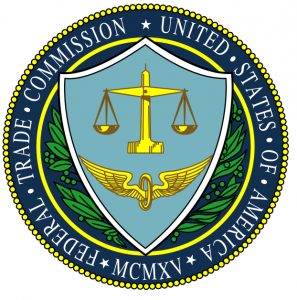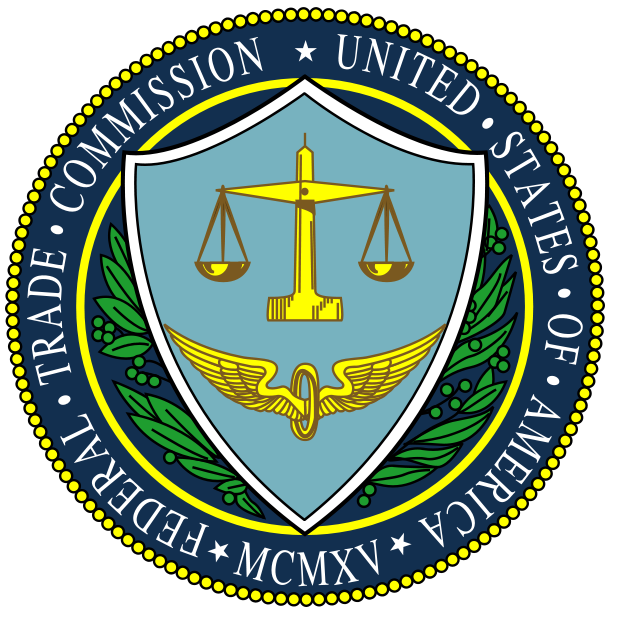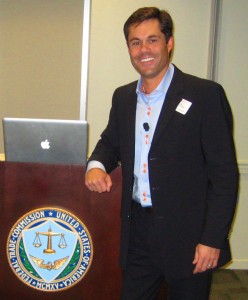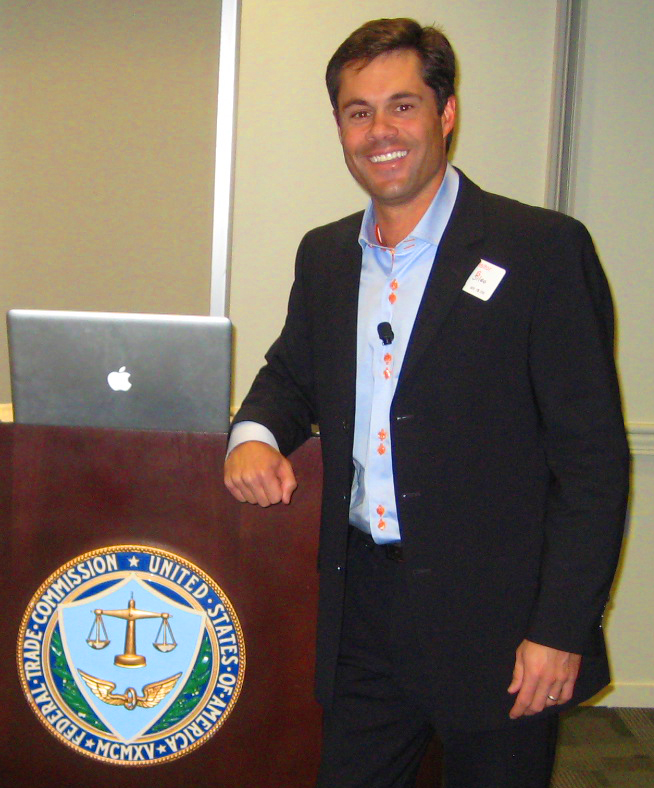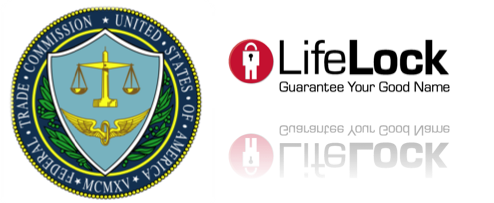Home | Solutions Blog | FTC
Posts tagged "FTC"
 Do you have a nagging sense that Facebook isn’t always straight with you about how they share your personal information, photos, posts, friend lists, networks, likes and surfing habits? That they are selling your data in ways that you have never even imagined?
Do you have a nagging sense that Facebook isn’t always straight with you about how they share your personal information, photos, posts, friend lists, networks, likes and surfing habits? That they are selling your data in ways that you have never even imagined?
Your instincts are dead on. Facebook has been saying one thing to our faces and doing another behind our backs. Facebook is in pre-IPO mode and has the propaganda machine running overtime like Big Brother at an Animal Farm.
Enter the Federal Trade Commission (FTC). The FTC just released a formal complaint identifying eight counts against Facebook for violating the Federal Trade Commission Act. The FTC confirmed what we’ve always known: Facebook tells us what they think we want to hear, not necessarily the truth. Here are the details of Facebook’s dishonesty:
- Under the guise of increasing user privacy, Facebook has consistently provided their advertisers with ever-expanding access to sensitive user information, not less.
Posted in Digital Reputation & Trust, Fraud Detection & Prevention, Online Privacy by Identity Theft Speaker John Sileo.
Tags: "Facebook FTC", "FTC Complaint", Complaint, Facebook, FTC, Privacy, Sileo
Can social media and privacy mix? The short answer is no. Social media is social by nature (meaning others are involved) and is media based (meaning that the materials are designed to be easily communicated and shared). When something is essentially named Share with Others, privacy is an afterthought. But that doesn’t mean it should be completely non-existant, or at least transparent – so that we know what we are sharing with others.
The FTC (Federal Trade Commission) is about to hold Facebook to stronger safeguards regarding user privacy, but in the end, it won’t matter very much because they are leaving Facebook with lots of wiggle room.
Rumor has it that Facebook will soon have to acquire users’ consent before making changes to privacy policies that affect current user data. That is a total contrast to what they’ve done in the past, which is to rewrite their privacy policies to be less protective without so much as giving users a whiff of the changes to their privacy.
Posted in Identity Theft Prevention by Identity Theft Speaker John Sileo.
Tags: Facebook, FTC, Privacy, safety, Security, Sileo
According to the Federal Trade Commission, Identity Theft still tops the annual list of consumer complaints. The list was released last Tuesday and Identity Theft was #1 for the 11th year in a row with more than 250,000 complaints. Identity theft accounts for 19% of all consumer complaints received by the FTC last year.
Why is this such a lingering, time-tested problem? Because most people, most businesses, read about it being such a terrible problem, and then go off an do little about it. Corporations fail to train their employees on personal identity theft, and that lack of skill and prevention framework seeps into the workplace. This, in turn, leads to the loss of more data, customer records, employee files and intellectual capital.
The report also states that the Miami-Ft. Lauderdale, Fla. area ranks #1 in the nation for identity theft complaints per capita. Number 2 on that list is Brownsville, Texas followed by Dunn, N.C.
Posted in Identity Theft Prevention by Identity Theft Speaker John Sileo.
Tags: Consumer Complaints, FTC, identity theft expert, Identity Theft Prevention, John Sileo
According to a recent New York Times article, the government may be creating a department solely dedicated to strenghthening privacy policies within the United States and other countries. A recent report details why such a force is necessary. Although this new office would lack enforcement authority, they would work directly with the administration and necessary agencies to attack and solve privacy issues.
“America needs a robust privacy framework that preserves consumer trust in the evolving Internet economy while ensuring the Web remains a platform for innovation, jobs and economic growth,” the Secretary of the Commerce, Gary F. Locke, said in a statement. “Self-regulation without stronger enforcement is not enough. Consumers must trust the Internet in order for businesses to succeed online.”
The policy task force already suggested we make visible exactly what information is collected online through a “Privacy Bill of Rights.” Companies that collect this information will then have increased accountability and limits on what they can do with information collected.
Posted in Cyber Data Security, Fraud Detection & Prevention, Identity Theft Prevention by Identity Theft Speaker John Sileo.
Tags: "Identity Theft, Expert, Federal Office, FTC, Identity Theft Speaker, John Sileo, New York Times, Online, online privacy, Online Privacy Office, Online Safety, Privacy, Security
The FTC just busted a long-running internet scam where offshore thieves set up virtual companies and stole millions of dollars from US consumers one small charge at a time.
“It was a very patient scam,” said Steve Wernikoff, a staff attorney with the FTC who is prosecuting the case. According to him, the scammers found loopholes in the credit card processing system that allowed them to set up fake U.S. companies that then ran more than a million phony credit card transactions through legitimate credit card processing companies.
The fraudsters were able to fly under the radar for so long because they only charged consumers between $ .25 and $9 and set up over 100 fake companies to pull off these transactions. In this specific case they charged over 1.35 million credit cards a total of $9.5 million dollars – those nickles and dimes really add up! Shockingly, 94% of these charges went undetected by the credit card holder because they didn’t notice an unusual charge on their credit card statements and fraud detection agencies rarely detect anything under $10.
Posted in Identity Theft Prevention by Identity Theft Speaker John Sileo.
Tags: credit card fraud, credit card scam, Fraud, FTC, Identity Theft Prevention, Identity Theft Speaker, John Sileo, scammers, Theft, thief, Victim
FTC Red Flags Rule Goes into Effect June 1st, 2010
The FTC will begin enforcing the Red Flag Rule on June 1st, which states that certain businesses and creditors must help fight identity theft as well as create an identity theft prevention plan. This applies to a very broad class of businesses: those defined as “financial institutions” and those that extend any type of credit to their customers.
In other words, if you don’t receive cash the moment you deliver your product or service to your customer, your business most likely falls under the umbrella of the Red Flags Rule. If you do any billing after the fact (i.e., accounts receivable), you are considered a creditor, and therefore in the group of companies governed by Red Flags.
This includes:
- Any Business that Extends Credit
- All Banks
- Most Brokerage Firms
- Credit Card Companies
Posted in Fraud Detection & Prevention, Identity Theft Prevention, Video Tips by Identity Theft Speaker John Sileo.
Tags: Boot Camp, Business Identity Theft, Business Survival, Compliance, FTC, Identity Theft Prevention, John Sileo, Privacy Survival, Red Flag, Red Flags, Red Flags Rule
How long has it been since you wore a white belt in your area of expertise?
I just had the singular honor of delivering an identity theft speech for the Federal Trade Commission in Washington, D.C. In case you don’t understand the humorous irony, let me explain.
The FTC is the arm of the U.S. Government that is responsible for educating you and me about our rights as consumer, including how to fight identity theft. In other words, they are the original identity theft experts! Those of us who are professional identity theft speakers turn to the FTC for information, guidance and materials.
So why did they pay my fee to talk about a subject they know so much about?
Perspective.
Posted in Identity Theft Prevention by Identity Theft Speaker John Sileo.
Tags: Federal Trade Commision, Financial Speaker, FTC, Government, Identity Theft Speech, John Sileo, Privacy
The Federal Trade Commission and 35 state attorneys general filed a complaint against the company that “charged that the company used false claims to promote its identity theft protection services,” according to a March 9th FTC press release. LifeLock will be responsible for paying the FTC $11 million dollars as well as an additional $1 million to the 35 state attorneys general.
To clarify a couple of points that aren’t currently being covered by the media:
- LifeLock did make misleading claims about how completely their product protected individuals, but to their credit, they toned those claims down considerably starting about a year ago. In essence then, the ruling pertains to LifeLock of old, not the current company, marketing materials or product offering.
- At about the same time as they changed advertising, LifeLock began adding features to its product that bolstered the quality of its monitoring services.
Posted in Identity Theft Prevention by Identity Theft Speaker John Sileo.
Tags: FTC, identity theft expert, LifeLock, Settlement
 Do you have a nagging sense that Facebook isn’t always straight with you about how they share your personal information, photos, posts, friend lists, networks, likes and surfing habits? That they are selling your data in ways that you have never even imagined?
Do you have a nagging sense that Facebook isn’t always straight with you about how they share your personal information, photos, posts, friend lists, networks, likes and surfing habits? That they are selling your data in ways that you have never even imagined?